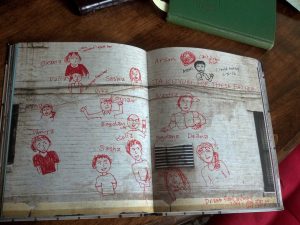Christians are a highly compassionate people, a generous people when it comes to supporting long term missions or short-term mission trips. I stepped outside the U.S. for the first time to serve with Hope for Orphans in Ukraine, able to go by the prayerful and monetary support of many. When I got back the briefest description I could give of my time there was that I had been traumatized for Christ. My team prepared me well for the reverse culture shock I experienced in returning to Western civilization. What I wasn’t prepared for was the strict social contract in Christendom when it came to sharing my experiences with them.
For two months, I felt dangerous, like my words were a live grenade I carried around with me. When I shared anything real many of my Christian conversational partners expected me to edit or qualify what I shared with positive faith statements. At the first missions sharing night I could manage to speak at, an older gentleman approached me and gently corrected everything I had shared, drawing on his own experiences in Ukraine. Christians weren’t content to let my experience and theirs co-exist unless I tied in some grander form of hope or note on God’s sovereignty. My grieving and my anger frightened them.
Here’s some of what I thought but couldn’t say to my fellow believers:
It was hard.
I can tell you about the joyful moments I had, and how faithful God was to show up. Thank you for praying, that meant a lot. But please stop expecting me to spin some disneyfied version of this steps-towards-the-Kingdom adventure I had. The spiritual darkness there is real. I met teens and children, imago dei, who are powerless, physically and sexually abused, who have no advocate save God and the believers that I served alongside. There was no poetic victory moment a la the apostle Paul in prison for me. I served, I was broken. I failed. I prayed. I kept serving. I fought. That’s what really happened.
I served, I was broken. I failed. I prayed. I kept serving. I fought. That’s what really happened.
I’m grieved and have very little hope.
What I saw broke my heart. And it is still breaking for those kids I got to love in person for eleven days. So if you want me to take that leap right to Jubilee, to end my statements of doubt with qualifiers about the bigness of God or eternal things, I can’t do it. Quoting Romans 8:28 at me in this moment is to wound me. I have not lost my faith, but I’m not through the valley of the shadow yet.
But wait a minute, you might observe, what about 1 Thessalonians 4:13 that essentially says that believers do not grieve as the secular world does, without hope?
First of all, the larger context of the passage is answering the grief of death with the hope of the resurrection of the dead. Secondly, hopelessness is not a faith litmus test, any more than salvation is, or we’d all be screwed. After we come to Christ we will still experience doubts and hopelessness this side of the Eschaton. Just as my salvation is obtained by the work of Christ and secured entirely in Him, so also is all of my hope in Him. The good news is that hope will remain because of who He is, and is not contingent upon whether I can access it personally, emotionally, or spiritually. I may be hopeless, He remains hopeful; He cannot deny himself. Expecting me to simply push towards hope too soon is to ask me to count the suffering I’ve seen as cheap. If you want to bear this burden with me, then hope for me as you pray for me. And let me grieve.
If you want to bear this burden with me, then hope for me as you pray for me. And let me grieve.
I can’t talk about it yet.
I can now (9 months later) but I couldn’t right after the trip. For a few months, I had no tongue for these things. If you ask me what I think and feel about what I experienced right after my trip, the short answer is “I don’t know.” I am still talking to God about it constantly. I am still living it and the loss of not being there.
Some days my journal entries look like this:

And other days like this (Where I can’t access any words, all I can do is draw faces and write their names):

When I can’t verbalize yet, be patient with me.
I’m angry.
I’m angry at myself. I’m angry at American lifestyles. I’m angry at first world problems, and middle-class melodrama, and the American Church. I’m angry at God for not judging us. I’m angry at God for not letting me change everything and protect and deliver everyone. Clearly, my anger has nothing to do with fairness, or mercy, or rationality. Even if some of it is righteous, that doesn’t mean I know how to apply it righteously, and I know that. So please, don’t be afraid of my anger. Let me be angry.
So please, don’t be afraid of my anger. Let me be angry.
I’m questioning God’s justice AND I’m convinced He’s working.
Don’t ask me how this works. God has no problem with Paradox and this is the form that my faith is in right now. Most of my exchanges with Him consist of “Where were you?” and “I know you are there in Your Church. I know you were there in the Ukrainians and the Americans and in me.” He did too much for me to deny His presence, and at times I still felt entirely alone. When your first instinct is to correct my theology, listen to the Spirit of God, and speak into my life with gentleness. Or listen in silence. My extreme statements are not a marker of lost faith. If I do lose my faith for a short time, He will bear with me, please do the same.
As I work it out with fear and trembling, stand with me, trust the Spirit’s work, and let my contradictions stand also.
I don’t want to be here anymore. I want to be there.
Eighty-five percent of the time this is my desire; don’t take it personally. Those saints and kids are my people now. I love you also, and I know God has called me to be back in the states for a season. As time goes by, I’m going to see God’s placement of me more clearly, but for now, I’m aching to be there. Hear my longing as a longing for the kingdom and a new understanding of the Church as global.
Ask me who what was beautiful there, for He is “lovely in limbs and lovely in eyes not His.”
I want to go back and I want you to come with me.
I know that dread of having me say this to you, may be why you tell me you “want to hear all about it” but then avoid actually having a conversation about my trip.
When you see me this emotionally torn-up about my time there, because you love me, you’re not going to want me to go back. But to love deeply is to risk deeply, and when I suffer to be Christ to the least of these I am participating in His calling of the Church.
I am living what Paul said in Colossians 1:24 (ESV) of the people he loved and served:
Now I rejoice in my sufferings for your sake, and in my flesh I am filling up what is lacking in Christ’s afflictions for the sake of his body, that is, the church.
We affirm that Christ’s work on the cross was complete, so what is this verse about? Our calling. We willingly participate in Jesus Christ’s suffering by enduring the physical, mental, emotional, and spiritual pain that occurs when we put ourselves on the line for the needs of saints across the world. It is what we pledge ourselves to when we say, I will go, send me. Suffering on a mission trip is bearing our crosses. We live the great commission out in the marks on our bodies and souls, and in doing so we participate in Christ.
What has cost me greatly, I would never trade back. And I want you, my sister, my brother in the living God, to come with me next time. Think about it. Pray about it. Let’s go together.
See how you can participate.
www.hfo.net.ua

